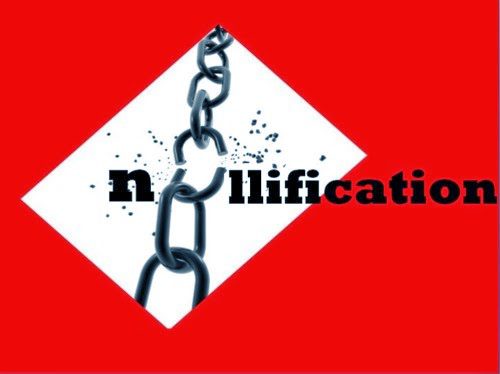
The following was originally published on The Liberty Institute of Freedom and Economics (LIFE).
The history of the United States has been a history of the growth of the federal government and the degradation of individual and local sovereignty. As government centralizes, the State forces us into a “one size fits all” approach to not just government, but culture. With the death of local sovereignty comes the rise of the superstate, where the only checks on their power are the arbitrary rulings of the elites within their own ranks. To put it quite simply, the federal government will not check itself, and the American Empire will continue to grow so long as no outside force puts the federal government in check.
There is, of course, one way to resist federal tyranny that the government does not want you to know about: nullification. For the sake of this article, nullification will be defined as “any act or set of actions, that result in a particular law being rendered null, void, or even unenforceable within a particular area.” With this definition, we can see that nullification is simply an action that stops a law from taking effect within the geographical confines of a polity. So, if a state government passes a law forbidding the enforcement of a specific federal law in the state, the state is taking part in an act of nullification.
While the establishment wants you to believe that it is the job of the Congress to determine the laws in the US and the Supreme Court’s job to shut down unconstitutional laws, this is far from the case. In truth, any unconstitutional law immediately loses its legal power within the United States, and it is the right and the duty of state and local governments, and also the common individual, to resist these laws to render them null, void, or unenforceable. In other words, it is the right of the people to nullify tyranny.
Whereas state and local governments value their sovereignty, they have an incentive to limit the federal government as much as possible. The state’s right to nullify, however, does not come from the state, it comes from the people and their right to self-defense. As a self-owner, you have the right to defend yourself and your property from aggression; this includes aggression from a government. While the government is inherently unjust, we live in a world where the State does exist. With that in mind, the only role of government should be to preserve the natural rights of the people. In a federal system, this role of government gives local and state governments the duty to stop the federal government’s influence on the people.
Nullification is Constitutional
One of the top objections to the idea that the states should nullify federal laws they deem unjust or unconstitutional is that it is unconstitutional. This could not be more false. The Tenth Amendment reads that “The powers not delegated to the United States by the Constitution, nor prohibited by it to the States, are reserved to the States respectively, or to the people.” Nowhere in the constitution is the power of nullification given to any federal entity, so clearly that nullification is not an enumerated power of the federal government. Article I, Section 10 of the Constitution outlines powers that the states are not allowed to do, and nullification is not on the list either. So, nullification is not a federal power. Nullification is not prohibited to the states. Therefore, Nullification is a protected power of the states as delegated under the 10th Amendment.
One objection that some will use is that the Supremacy Clause of the Constitution gives the federal government the power to stop nullification. The Supremacy Clause reads as such: “This Constitution, and the Laws of the United States which shall be made in Pursuance thereof; and all Treaties made, or which shall be made, under the Authority of the United States, shall be the supreme Law of the Land; and the Judges in every State shall be bound thereby, any Thing in the Constitution or Laws of any State to the Contrary notwithstanding.”
The “constitutionalists” say this settles the argument, but they ignore the true meaning of this clause. To be specific, they completely ignore the phrase “in Pursuance thereof.” This phrase makes it clear that the federal government is only supreme when they are pursuing actions specifically authorized for them to pursue by the Constitution. The Supremacy Clause, when put in modern terminology, essentially says “This Constitution and the Laws of the United States which this Constitution authorizes… shall be the supreme Law of the Land….” In other words, there is no argument that the constitution bans nullification. In fact, the 10th Amendment encourages it.
Kentucky and Virginia

In 1798, Thomas Jefferson and James Madison drafted the Kentucky and Virginia Resolutions respectively. In these resolutions against the Alien and Sedition Acts, the two founders explained why nullification is the path to liberty.
In the Kentucky Resolution, Jefferson declared nullification as “the rightful remedy” to federal tyranny. In fact, he did not see nullification as a power of the states, but as a natural right of the people. In Jefferson’s mind, an unconstitutional law is already null and void (Alexander Hamilton concurred with Jefferson in Federalist 78), it is just the duty of the states to refuse to comply with this law. Jefferson’s justification that Nullification is a natural right stem from his belief in self-defense. Simply put, if a government becomes tyrannical, it is the right of the people to abolish that government.
Madison echoes much of the sentiment of Jefferson in the Virginia Resolution. But he also outlines a process of how to nullify a law, which he also elaborated upon in Federalist 46. The way to nullify, according to Madison, follows as such:
- Noncompliance with the officers of the Union. If the federal government passes tyrannical legislation, it is the duty of the state governments to treat the feds the way the colonists treated the British. Ensure that they are not able to enforce these laws in the states. Northern states did this in the 1850s by passing Personal Liberty Laws to resist the Fugitive Slave Act.
- Mass Protests. When the masses come out against federal tyranny, state-level officials realize that they risk their power if they choose to comply with federal orders. We can see this with the example of Sanctuary Cities in the modern immigration crisis. City and state governments that resist ICE likely have a dissatisfied voter base who believe that Trump’s immigration policies are unjust and are willing to protest these.
- Outspoken governors. Voters don’t take their state and local officials seriously anymore. But they should. It is incredibly important that the state officials feel emboldened to speak out against an overbearing federal government.
- State legislation. If state governments pass laws saying that a federal law is unenforceable within that jurisdiction, this law is nullified. The states have this right, especially when the federal government is passing unconstitutional laws. We can see this with the state governments passing laws that decriminalize or legalize cannabis, even though it is banned at the federal level.
If All Else Fails
The most extreme act of nullification is, of course, secession. If a central government becomes too overbearing, it is within the rights of a local sovereign to assert their rights to self-defense and separate from their oppressor. In the same way, nullification comes from the right to self-defense, so too does the right of secession. Secession nullifies not just a specific law, but all laws passed by the central government.
We must remember, however, that secession is not just a state right. It is an individual right. If we reject the right of secession, we reject the right of one political unit to dissolve its bands to another. Divorce, for example, is an act of secession. The American Revolution was an act of secession. The right of secession is an individual right that must be revived in order to stop the rise of the total state.
Nullification: A State Right AND an Individual Right
While the states have the ability to nullify federal tyranny, who will nullify state and local tyranny? Individuals, of course! It is the individual right to self-defense from which the right of nullification comes, so why would the individuals not have the right to nullify? One of the most famous examples of individual nullification, though none dare calls it nullification, was the Underground Railroad.
In 1850, former President Millard Fillmore signed the Fugitive Slave Act, which made a farce out of due process, into law. The public responded by establishing the Underground Railroad, a system of activists who aided escaped slaves by helping them go to Canada, where slavery was illegal. It was after the Underground Railroad’s establishment that encouraged almost every northern state to pass Personal Liberty Laws, which restored due process for those accused of running from slavery. Some states even went further than that. There are several recorded instances of state law enforcement arresting federal marshals for attempting to enforce this law.
A more recent act of nullification is Cody Wilson’s work toward 3D printing firearms. The rights of all people are being violated by unjust state and federal gun laws. Wilson, however, has made a way for one to bypass all gun laws: print your own! You have every right to bear arms and the government has no right to infringe upon that. Cody Wilson’s innovation has made all gun laws effectively unenforceable. Cody Wilson used nullification to grow freedom.
Answering Objections to Nullification
Slavery
The people who are against nullification, especially secession, claim this issue was answered in 1865. However, as alluded to before, nullification was used to fight slavery. From Personal Liberty Laws to the Underground Railroad, the states were resisting the adamantly pro-slavery federal government. And they won. Despite the fact that the federal government upheld slavery through the Fugitive Slave Act and the Dred Scott decision, slavery was unenforceable in northern states. In fact, one of the main reasons South Carolina seceded from the union was because the northern states so successfully nullified the Fugitive Slave Act. Nullification opposes slavery. Although one should never use the force of the State to decide right and wrong, I guess the naysayers are kind of right. The question was answered in 1865, and the nullifiers won with shining colors.
Civil Rights
Some naysayers point out that state governments used nullification as a means to enforce Jim Crow laws in the mid-20th century. This is a problematic truth, at best. Plessy vs. Ferguson, a federal SCOTUS decision, ruled that Jim Crow laws were constitutional, giving the “separate but equal” doctrine. But the background of this case proves that nullification would have helped. The 1890 Separate Car Act forced racial segregation on train cars in Louisiana. But the train companies opposed this law. This is why a company allowed Homer Plessy to board a “White Only” train car. The private sector was attempting to nullify a tyrannical state law (remember that nullification is an individual right) but failed due to an out of control Supreme Court.
In addition to the Plessy vs. Ferguson case, we can see that the greatest atrocities of human history were committed by governments. From the Holocaust and other instances of genocide, democide committed by the communists, slavery, the eradication of the Native Americans, the Trail of Tears, war, and so on, government has killed and oppressed far more than the private sector could ever dream to.
But even if this was not the case, and that nullification was used to enforce civil rights abuses rather than the federal government (which was the entity that actually enforced these abuses), this does not discredit nullification. Nullification is a principle separate from the policies. It does not matter why one nullifies. It matters that they nullify because that is their right.
Nullification is Happening Right Now, and it is Saving Money and Lives!
Prohibition has been one of the most devastating government policies in the United States. The war on drugs has cost taxpayers $1 trillion dollars in 40 years and has led to the loss of freedom for millions of nonviolent people. State governments, however, are fighting the drug war.
In 1996, California passed Proposition 215, legalizing medical cannabis. California did this in spite of the federal ban on all forms of cannabis. Upon the successful passage of Prop 215, the Bill Clinton Justice Department announced their intentions to still enforce the federal ban. Since Clinton made this statement, 9 states have legalized recreational cannabis, 13 more states have decriminalized it, 30 states have legalized medical cannabis, and ZERO federal cannabis arrests have occurred in states that have legalized pot.
Nullification is the Rightful Remedy to Centralization
Nullification is the path to curbing the federal government. As time goes on, it becomes more and more clear that freedom will not be defended by a central entity. What matters is local sovereignty. At the local level, politicians are more easily held accountable. They are more inclined to align themselves with the values of their constituents. So, in terms of government, smaller is better.
When government localizes, the world sees a greater diversity in policy and culture. The people within each polity are more inclined toward cooperation whereas we know our neighbors, but not the communities that are thousands of miles away from us. In other words, we should let the Californians be Californians, let the Texans be Texans, let the Kentuckians be Kentuckians, and so on.
Imagine a world under one government. Imagine if China became a hegemon to the extent that it could impose its will on Americans. Imagine if China declared itself the world’s policeman. Imagine if China bombed hospitals and schools in the US to impose its will upon you. Would you not rebel?
To deny decentralization is to accept the idea that we should centralize and that one size fits all in terms of culture and politics. But we can objectively observe that this is not the case. So long as we reject world government, we must accept decentralization. If the US has the right to exist independent of a world government, should not the states have the right to exist independent of the US? Should not the cities have the right to exist independent of the states? The neighborhoods independent of the cities? The individual separate from the neighborhoods? In matters of decentralization, logic dictates the importance of consistency. To reject one facet of decentralization is to reject all facets of decentralization.
In other words, nullification is the answer. To resist tyranny, localize. Not only will this stop tyranny, it will also lead to greater harmony among communities, diversity in policy, and a greater power of the people to “vote” with their footprints.




